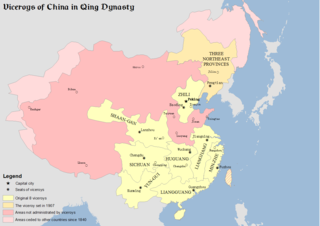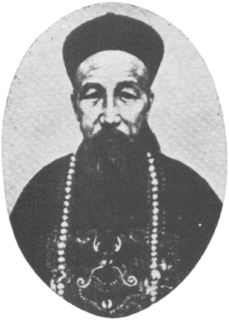This relies largely or entirely on a single source .(August 2018) |
| |||||
| Decades: | |||||
|---|---|---|---|---|---|
| See also: | Other events of 1852 History of China • Timeline • Years | ||||
Events from the year 1852 in China .
This relies largely or entirely on a single source .(August 2018) |
| |||||
| Decades: | |||||
|---|---|---|---|---|---|
| See also: | Other events of 1852 History of China • Timeline • Years | ||||
Events from the year 1852 in China .
Qishan, courtesy name Jing'an, was a Mongol nobleman and official of the late Qing dynasty. Although he was of Mongol descent, his family was under the Plain Yellow Banner of the Manchu Eight Banners. He is best known for negotiating the Convention of Chuanbi on behalf of the Qing government with the British during the First Opium War of 1839–42. Some view him as a traitor.

The Viceroy of Zhili, fully referred to in Chinese as the Governor-General of Zhili and Surrounding Areas Overseeing Military Affairs and Food Production, Manager of Waterways, Director of Civil Affairs, was one of eight regional Viceroys in China proper during the Qing dynasty. The Viceroy of Zhili was an important post because the province of Zhili, which literally means "directly ruled", was the area surrounding the imperial capital, Beijing. The administrative centre was in Tianjin even though the provincial capital was in Baoding. The Viceroy's duties as well as responsibilities have never been defined entirely. Generally speaking, the Viceroy oversaw the military and civil affairs of Zhili, Shandong and Henan provinces. The Viceroy of Zhili was also highly influential in imperial court politics.
Nergingge or Ná’erhgingá was a Qing dynasty official who was Viceroy of Zhili from 26 February 1841 - 6 October 1853, Viceroy of Huguang in 1840, and Viceroy of Shaan-Gan. He was a member of the Plain White Banner.

The Viceroy of Min-Zhe, fully referred to in Chinese as the Governor-General of Taiwan, Fujian and Zhejiang Provinces and Surrounding Areas Overseeing Military Affairs and Food Production, Manager of Waterways, Director of Civil Affairs, was one of eight Viceroys in China proper during the Qing dynasty. The "Zhe" refers to Zhejiang Province while "Min" is the abbreviation of Fujian Province. Taiwan was also under the Viceroy's control until after the 1895 Treaty of Shimonoseki.

The Second Opium War, the Second Anglo-Chinese War, the Second China War, the Arrow War, or the Anglo-French expedition to China, was a war pitting the United Kingdom and the French Empire against the Qing dynasty of China, lasting from 1856 to 1860.

The Taiping Rebellion, also known as the Taiping Civil War or the Taiping Revolution, was a massive rebellion or civil war in China that was waged from 1850 to 1864 between the established Manchu-led Qing dynasty and the Taiping Heavenly Kingdom.

Zeng Guofan, Marquis Yiyong, birth name Zeng Zicheng, courtesy name Bohan, was a Chinese statesman, military general, and Confucian scholar of the late Qing dynasty. He is best known for raising and organizing the Xiang Army to aid the Qing military in suppressing the Taiping Rebellion and restoring the stability of the Qing Empire. Along with other prominent figures such as Zuo Zongtang and Li Hongzhang of his time, Zeng set the scene for the Tongzhi Restoration, an attempt to arrest the decline of the Qing dynasty. Zeng was known for his strategic perception, administrative skill and noble personality on Confucianist practice, but also for the ruthlessness of his repression of rebellions. He exemplified loyalty in an era of chaos, but is also regarded as laying the foundation to the rise of modern warlordism in China. William T. Rowe describes him as the "de facto representative of Qing control in most of central and south China" during the 1850's and 60's.

The Xianfeng Emperor, personal name Yizhu, was the ninth Emperor of the Manchu-led Qing dynasty, and the seventh Qing emperor to rule over China proper, from 1850 to 1861. During his reign the Qing dynasty experienced several wars and rebellions including the Taiping Rebellion, Nian Rebellion, and Second Opium War.

The Viceroy of Liangjiang or Viceroy of the Two Jiangs, fully referred to in Chinese as the Governor-General of the Two Yangtze Provinces and Surrounding Areas Overseeing Military Affairs, Provisions and Funds, Manager of Waterways, Director of Civil Affairs, was one of eight regional Viceroys in China proper during the Qing dynasty. The Viceroy of Liangjiang had jurisdiction over Jiangsu, Jiangxi and Anhui provinces. Because Jiangsu and Anhui were previously part of a single province, Jiangnan, they were thus known, along with Jiangxi, as the two jiangs, hence the name "Liangjiang".

Xu Garden, also called Xihuayuan is a classical Chinese garden in Xuanwu District, Nanjing, Jiangsu, China. It is located on the west side of the Presidential Palace in Nanjing. It is also one of two prominent gardens in Nanjing alongside the Zhan Garden.
New Songs from the Jade Terrace is an anthology of early medieval Chinese poetry in the romantic or semi-erotic "palace style" that dates to the late Southern dynasties period (420–589). Most editions of New Songs contain 670 poems by many different authors, mainly comprising pentasyllabic poetry but also some yuefu lyrical verse and other types of poems. New Songs was probably compiled around the early to mid-530s by Xu Ling, an official and scholar who served at the court of Xiao Gang, a crown prince of the Liang dynasty (502–587) who later ascended the throne as Emperor Jianwen of Liang.

Sigh of His Highness is a Chinese historical television series based on the life of Prince Gong, an influential Manchu prince and statesman of the late Qing dynasty. The series was directed by Li Wenlong and starred Chen Baoguo as Prince Gong. It was first broadcast on Sichuan TV in China in 2006.
Events in the year 1900 in China.
The Viceroy of Rivers and Waterways in Jiangnan Overseeing Military Affairs, better known simply as the Viceroy of Southern Rivers or Viceroy of Southern Rivers and Waterways, was a government office in China proper during the Qing dynasty. The office was based in Qingjiangpu (清江浦), which is now a district of Huai'an City, Jiangsu Province. The Viceroy usually held the rank of a deputy first-grade official or a regular second-grade official. The Viceroy was in charge of dredging and embankment projects in the waterways of Jiangsu Province.
Events from the year 1860 in China.
Events from the year 1861 in China.
Events from the year 1857 in China.
Events from the year 1855 in China.
Events from the year 1854 in China.
Events from the year 1853 in China.
Events from the year 1851 in China.
Events from the year 1850 in China.
Events from the year 1849 in China.
Events from the year 1848 in China.
Events from the year 1845 in China.
Events from the year 1847 in China.
Events from the year 1846 in China.